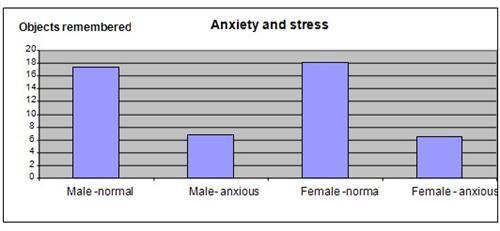| Complexity level: | 4 |
| Project cost ($): | 30 |
| Time required: | 1 hour for preparation, 2 days for experiment |
| Material availability: | Easily found |
| Safety concerns: |
Hypothesis
The students will be anxious about being on stage, which will affect their memory adversely.
Overview
Anxiety and memory
We all undergo stress and anxiety in our lives; it is part and parcel of life. Stress and anxiety may be caused by exam pressures, competition, high expectations, worry, fear and many other factors. How we deal with stress and anxiety will differ among individuals.
Stress and anxiety have always been known to affect our memory and learning abilities. How often have we burned the midnight oil doing last-minute revision, only to enter the exam hall unable to remember anything? For many of us, the pressure of wanting to impress during an interview ironically causes us to perform poorly. Our ability to think, learn and remember becomes impaired when we are stressed.
When we become stressed, the hormones regulating our response to stress and anxiety will start to affect our brain functions and ability to communicate. During periods of stress, the hormone cortisol will circulate in our body. The hormone corticotopin will affect our brain’s ability to remember during anxious moments.
Scientific Terms
Materials
The materials required for this science fair project:
- 20 male participants age 12 years old
- 20 female participants age 12 years old
- 50 random unique objects – e.g.. soda can, watch, ball, clock, table, umbrella, banana, cell phone, radio, etc.
- 1 stopwatch
- 40 sheets of paper and pencils
- A classroom
- 2 curtains, bedsheets or blankets
- An adult assistant
Procedure
1. For this science fair project, the independent variable is the gender of the participants and their anxiety levels (calm or stressed). The dependent variable is the ability of the male and female participants to remember the objects that they saw. This is determined by asking them to write down or recite from memory a list of the objects they had seen previously. The constants (control variables) are the number of objects, the time given to look at the objects and the time given to write down or say the list of objects.
2. Separate the objects into 2 groups of 25 each. Arrange the first set neatly at the front of a classroom, and the second set at the back of the classroom. Then, cover each set of objects with a blanket so that none of the participants will be able to see them before the test.
3. Select 20 12-year-old boys and 20 12-year-old girls for the science fair project and bring them to the classroom. Remove the blanket covering the first set of objects. Ensure that all participants are able to see the objects clearly at all times. Allow them 2 minutes to memorize the names of all the objects laid out. Monitor the time with a stopwatch.
4. Give each participant a sheet of paper and a pencil. Ask each participant to write down their name, age and gender at the top of the paper, followed by a list of the objects that they remember seeing. Collect the papers after 10 minutes. Record the number of correct objects recalled by each participant in a table, as shown below.
5. The next day, bring the participants back to the classroom to look at the 2nd group of objects at the back of the classroom. Allow them 2 minutes to memorize the names of the objects set out. Now, one at a time, ask the students to recite from memory, the list of objects they had seen earlier - only this time, immediately before each student recites his list, whisper to him (without letting the rest of the class know) that he is being graded for this and the results will be counted towards his class performance. Tell him that a teaching assistant has been assigned to assess his performance and at that point have your assistant enter the room. Remember not to tell the rest of the students who the "assistant" is, until it is their turn to recite from memory. Record the number of correct objects recalled by each participant in a table, as shown below.

Results
The results show that anxiety has caused both boys and girls to forget most of the objects that they had seen. Most of the children became nervous once they were told that they were being formally assessed.
| Gender | Average number of objects correctly remembered |
| Male -normal | 17.4 |
| Male - anxious | 6.7 |
| Female - normal | 18.1 |
| Female- anxious | 6.5 |

Conclusion
The hypothesis that anxiety will cause short term memory of boys and girls to become poor has been proven to be true.
Stress and anxiety is something that everybody will experience at one time or another. A child may experience stress due to impending examinations or strict teachers. An adult could experience stress due to work or family expectations. People handle their stress differently based on their psychological and emotional condition. While such emotions cannot be fully avoided, they can be managed. Stress and anxiety can be relieved through yoga, meditation, exercise, aromatherapy or massage. Stress however, can serve as a powerful motivator, and to a certain extent, may in fact help improve a person's long term memory.
Also consider
The science fair project can also be done by comparing the effects of anxiety on the short-term memories of participants from different age groups.
The experiment may be modified by asking the participants to memorize a speech and speak on stage.
Ascertain whether stress helps improve long term memory.
References
Memory - http://en.wikipedia.org/wiki/Memory
How stress affect your memory - http://cognitive-psychology.suite101.com/article.cfm/how_stress_affects_your_memory
Coping with exam stress - http://www.health24.com/mind/Memory_and_cognition/1284-1297,14772.asp

